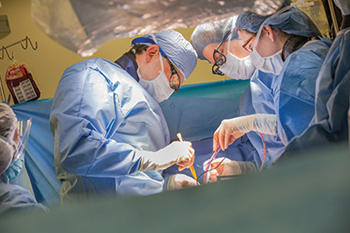Expert care from a top-rated heart disease team

Heart disease, also known as cardiac disease, is a term used to describe many conditions that affect the heart. The doctors in our cardiology program provide expert care for patients with all forms of heart disease, from straightforward cases to the rarest and most complex. Our advanced treatment options and knowledge of heart care consistently earns our team top ratings from the National Cardiovascular Data Registry and Society of Thoracic Surgeons.
Our cardiac surgeons are among the best in the mid-Atlantic region and among the finest in the country. We’re one of the highest-volume centers in the area for heart surgery, performing about 2,300 procedures a year, which translates into better outcomes for our patients.
We have a long history of creating and testing new surgical techniques and technologies, including minimally invasive procedures. This puts us at the leading edge of the most advanced, effective, and efficient care.
The MedStar Heart & Vascular Institute team is ranked high by the Society for Thoracic Surgeons in all three ranked categories: coronary artery bypass grafting (CABG), aortic valve replacement, and combined CABG and AVR. MedStar Washington Hospital Center received the highest three-star rating in all three categories, an achievement shared by an elite group of less than 5 percent of cardiac surgery centers in the United States and Canada. MedStar Union Memorial Hospital’s team received two stars in each of the three categories.
Our doctors perform nearly 50 percent of these procedures as off-pump bypass surgeries (beating-heart bypass), which we helped develop and perfect in the 1990s. This technique has a lower risk of complications, as well as a shorter hospital stay and recovery. In addition, our patients have access to clinical trials in which we test the newest methods of treating heart conditions.
Our sophisticated information management and communications capabilities are powerful resources for integrating our services and locations, from enabling real-time sharing of patient images and data to supporting electronic medical records. This means our patients receive advanced cardiac care no matter at which of our locations they seek care.
After surgery, our cardiac rehabilitation team works with patients to build back strength and lower the risk of future heart problems by helping them live a healthy lifestyle.
Types
What are the types of heart disease?
Some of the many types of heart disease we treat include:
-
Arrhythmia, an irregular heartbeat
-
Cardiomyopathy, or disease of the heart muscle
-
Coronary artery disease, a build up of plaque in the arteries
-
Congenital heart disease, or a heart disease you’re born with
What is your heart age?
Each year about 655,000 Americans die from heart disease – that’s one in every four deaths. Understanding your Heart Age is a way to assess your risk factors for heart attack and stroke. Some things put you at risk for a heart attack or stroke that you cannot change, such as getting older or your family history, but there are ways to lower your risk.
Procedures and treatments
Our surgeons work closely with other heart care experts, including cardiac imaging specialists, interventional cardiologists and nurses, to provide personalized surgical care for each patient. We regularly treat conditions such as:
Our surgeons also perform complex procedures such as:
Tests
Diagnosing heart disease is the first step to developing a treatment plan. Our specialists may recommend one or more diagnostic and imaging procedures.
Cardiac Catheterization
Cardiac catheterization is a minimally invasive way to diagnose and treat a variety of heart and vascular conditions by guiding thin, flexible tubes called catheters through blood vessels to problem areas.
Computerized Tomography (CT) Scan
The cardiac computed tomography scan, or cardiac CT, uses X-rays to create three-dimensional images of your heart and blood vessels.
Electrocardiogram (ECG)
An electrocardiogram, also known as an ECG, measures the heart’s electrical activity.
High-sensitivity C-reactive protein test
Holter monitors
A Holter monitor is a small device that records the heart’s electrical activity. It’s similar to an electrocardiogram, but whereas an electrocardiogram records over a few minutes, a Holter monitor records over the course of a day or two.
Magnetic Resonance Imaging (MRI)
Magnetic resonance imaging, better known as cardiac MRI, is a combination of radio waves, magnets, and computer technology to create images of your heart and blood vessels.
Stress Tests
Stress tests are used to assess how your heart works during physical activity. There are several types of stress tests, including treadmill or bike stress tests, nuclear stress tests, stress echocardiograms, and chemically induced stress tests.
Treatments
Our heart and vascular teams work together and with other specialties to develop and implement individualized plans to treat a wide variety of conditions. This could include lifestyle modifications, medication, or more advanced treatments.
Our providers
Location: Change location Enter your location
-
Jonathan A. Altschuler, MD
Cardiology
-
Rachel Barish, CRNP
Cardiology
-
Barbara Louise Bean, MD
Cardiology
-
Ebonique Bennett, ANP-BC
Cardiology
-
Lindsay Nicole Bussey, FNP-BC,CRNP
Cardiology
-
Ashley Nicole Cullen, CRNP
Vascular Surgery
-
Aubrey Grant, MD
Sports Cardiology & Cardiology
-
Kathryn S. Hilgartner, ANP-BC
Cardiology
-
Preetham N. Kumar, MD
Cardiac Imaging & Cardiology
-
Salman Masood Malik, MD
Cardiology
-
Michael Alan Matyas, MD
Cardiac Imaging, Ultrasound, Nuclear Medicine & Diagnostic Radiology
-
Kathleen Ann McClanahan, CRNP
Gastroenterology
-
Brittany A. Muchla, CRNP,C,FNP
Cardiology
-
Iris Ivette Perez-Greene, CRNP
Cardiology
-
Gaby Weissman, MD
Valvular Disease Cardiology, Structural Heart Disease Cardiology & Cardiac Imaging
-
Hasan Ismail Abdallah, MD
Pediatric Cardiology
Additional information
Cardiac Rehabilitation
Recover faster and improve your quality of life after heart disease or treatment with help from our exercise physiologists, physical therapists and dietitians.
Ask MedStar Heart & Vascular Institute
Have general questions for our heart and vascular program? Email us at AskMHVI@medstar.net. If you have clinically-specific questions, please contact your physician’s office.









